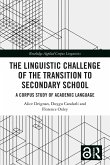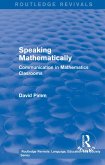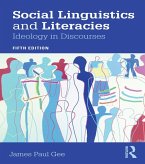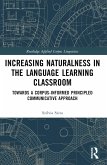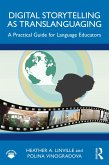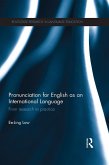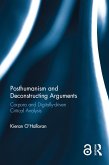Alice Deignan, Duygu Candarli, Florence Oxley
The Linguistic Challenge of the Transition to Secondary School (eBook, ePUB)
A Corpus Study of Academic Language
0,00 €
0,00 €
inkl. MwSt.
Sofort per Download lieferbar

0 °P sammeln
0,00 €
Als Download kaufen

0,00 €
inkl. MwSt.
Sofort per Download lieferbar

0 °P sammeln
Jetzt verschenken
Alle Infos zum eBook verschenken
0,00 €
inkl. MwSt.
Sofort per Download lieferbar
Alle Infos zum eBook verschenken

0 °P sammeln
Alice Deignan, Duygu Candarli, Florence Oxley
The Linguistic Challenge of the Transition to Secondary School (eBook, ePUB)
A Corpus Study of Academic Language
- Format: ePub
- Merkliste
- Auf die Merkliste
- Bewerten Bewerten
- Teilen
- Produkt teilen
- Produkterinnerung
- Produkterinnerung

Bitte loggen Sie sich zunächst in Ihr Kundenkonto ein oder registrieren Sie sich bei
bücher.de, um das eBook-Abo tolino select nutzen zu können.
Hier können Sie sich einloggen
Hier können Sie sich einloggen
Sie sind bereits eingeloggt. Klicken Sie auf 2. tolino select Abo, um fortzufahren.

Bitte loggen Sie sich zunächst in Ihr Kundenkonto ein oder registrieren Sie sich bei bücher.de, um das eBook-Abo tolino select nutzen zu können.
This book provides a unique analysis and description of the linguistic challenges faced by school students as they move from primary to secondary school, a major transition, which some students struggle with emotionally and academically.
- Geräte: eReader
- ohne Kopierschutz
- eBook Hilfe
- Größe: 1.19MB
Andere Kunden interessierten sich auch für
![The Linguistic Challenge of the Transition to Secondary School (eBook, PDF) The Linguistic Challenge of the Transition to Secondary School (eBook, PDF)]() Alice DeignanThe Linguistic Challenge of the Transition to Secondary School (eBook, PDF)0,00 €
Alice DeignanThe Linguistic Challenge of the Transition to Secondary School (eBook, PDF)0,00 €![Routledge Revivals: Speaking Mathematically (1987) (eBook, ePUB) Routledge Revivals: Speaking Mathematically (1987) (eBook, ePUB)]() David PimmRoutledge Revivals: Speaking Mathematically (1987) (eBook, ePUB)33,95 €
David PimmRoutledge Revivals: Speaking Mathematically (1987) (eBook, ePUB)33,95 €![Social Linguistics and Literacies (eBook, ePUB) Social Linguistics and Literacies (eBook, ePUB)]() James GeeSocial Linguistics and Literacies (eBook, ePUB)54,95 €
James GeeSocial Linguistics and Literacies (eBook, ePUB)54,95 €![Increasing Naturalness in the Language Learning Classroom (eBook, ePUB) Increasing Naturalness in the Language Learning Classroom (eBook, ePUB)]() Szilvia SzitaIncreasing Naturalness in the Language Learning Classroom (eBook, ePUB)42,95 €
Szilvia SzitaIncreasing Naturalness in the Language Learning Classroom (eBook, ePUB)42,95 €![Digital Storytelling as Translanguaging (eBook, ePUB) Digital Storytelling as Translanguaging (eBook, ePUB)]() Heather A. LinvilleDigital Storytelling as Translanguaging (eBook, ePUB)43,95 €
Heather A. LinvilleDigital Storytelling as Translanguaging (eBook, ePUB)43,95 €![Pronunciation for English as an International Language (eBook, ePUB) Pronunciation for English as an International Language (eBook, ePUB)]() Ee-Ling LowPronunciation for English as an International Language (eBook, ePUB)46,95 €
Ee-Ling LowPronunciation for English as an International Language (eBook, ePUB)46,95 €![Posthumanism and Deconstructing Arguments (eBook, ePUB) Posthumanism and Deconstructing Arguments (eBook, ePUB)]() Kieran O'HalloranPosthumanism and Deconstructing Arguments (eBook, ePUB)0,00 €
Kieran O'HalloranPosthumanism and Deconstructing Arguments (eBook, ePUB)0,00 €-
-
-
This book provides a unique analysis and description of the linguistic challenges faced by school students as they move from primary to secondary school, a major transition, which some students struggle with emotionally and academically.
Dieser Download kann aus rechtlichen Gründen nur mit Rechnungsadresse in A, B, BG, CY, CZ, D, DK, EW, E, FIN, F, GR, HR, H, IRL, I, LT, L, LR, M, NL, PL, P, R, S, SLO, SK ausgeliefert werden.
Produktdetails
- Produktdetails
- Verlag: Taylor & Francis eBooks
- Seitenzahl: 228
- Erscheinungstermin: 30. Dezember 2022
- Englisch
- ISBN-13: 9781000813661
- Artikelnr.: 66867416
- Verlag: Taylor & Francis eBooks
- Seitenzahl: 228
- Erscheinungstermin: 30. Dezember 2022
- Englisch
- ISBN-13: 9781000813661
- Artikelnr.: 66867416
- Herstellerkennzeichnung Die Herstellerinformationen sind derzeit nicht verfügbar.
Alice Deignan is Professor of Applied Linguistics in the School of Education, University of Leeds. She is the author of 'Metaphor and Corpus Linguistics' (2005, John Benjamins), and 'Figurative Language, Genre and Register' (2013, CUP, with Elena Semino and Jeannette Littlemore).
Duygu Candarli is currently Lecturer in Language Education at the University of Dundee. She specialises in academic discourse, corpus linguistics, second language writing, and writing assessment. She has published research articles on these areas in international peer-reviewed journals.
Florence Oxley is a Research Assistant in the School of Education, University of Leeds and a PhD candidate in Linguistics, University of York. She is interested in corpus linguistics, literacy, and first language acquisition, and has published on infant phonological development.
Duygu Candarli is currently Lecturer in Language Education at the University of Dundee. She specialises in academic discourse, corpus linguistics, second language writing, and writing assessment. She has published research articles on these areas in international peer-reviewed journals.
Florence Oxley is a Research Assistant in the School of Education, University of Leeds and a PhD candidate in Linguistics, University of York. She is interested in corpus linguistics, literacy, and first language acquisition, and has published on infant phonological development.
List of figures
Acknowledgements
1 Schools, the transition, students, and teachers
Alice Deignan, ORCiD: 0000-0002-9156-9168
Introduction
The transition and the context of this research
Issues at transition
Social, psychological, and emotional issues
Academic issues
Language and the transition
The voices of children in our project schools
Aims of this book
2 Academic language and the school transition
Alice Deignan, ORCiD: 0000-0002-9156-9168
Perspectives on the language of school
Bernstein's language codes and the language of school
The Systemic-Functional Linguistics Approach
BICS and CALP
CALS
Academic language and function
Academic language and social prestige
Function: academic language to facilitate and express academic thought
Register and genre
Features of academic language
Overview
Disciplinary language
The vocabulary of school
Polysemy and homonymy
Tiers
Grammar and discourse
Specific issues at transition
Conclusion
3 Corpus data and methods
Duygu Candarli, ORCiD: 0000-0001-9965-7835
Introduction
Constructing our corpus
Characteristics of our partner schools
Corpus design and representativeness
The written corpus
Representativeness and data gathering
Composition of the written corpus
Sub-registers
The spoken corpus
Corpus analytical methods used
Quantitative data analysis procedures
Multi-dimensional Analysis
Mixed and qualitative data analysis
Conclusion
4 Written school language registers and the transition
Duygu Candarli, ORCiD: 0000-0001-9965-7835
Introduction
The corpus
Analytical Steps
Statistical analysis
Multi-dimensional analysis of school language registers
Dimension 1: Involved versus informational discourse
Dimension 2: Narrative versus non-narrative discourse
Dimension3: Explicit versus situation-dependent discourse
Dimension 4: Overt expression of persuasion
Dimension 5: Impersonal versus non-impersonal style
Discussion
Conclusion
5 The language of English at the transition
Alice Deignan, ORCiD: 0000-0002-9156-9168
Florence Oxley, ORCiD: 0000-0002-6518-1717
Introduction
The KS2 and KS3 curricula
Assessment
Reading in Years 5-8
Reading for pleasure
Making inferences
Understanding genre, purpose, and audience; criticality
Writing in Years 5-8
Understanding genre, purpose, and audience
Language and metalanguage in Years 5-8
Vocabulary
Grammar teaching
Corpus studies of the language of English in Years 5-8
Method
The corpora used
Frequent word analysis
Keyword analysis
Results
Word frequency: aboutness
Keywords
Conclusion
6 The language of science at the transition
Alice Deignan, ORCiD: 0000-0002-9156-9168
Florence Oxley, ORCiD: 0000-0002-6518-1717
Introduction
The KS2 and KS3 curricula
Language and learning science at school
Scientific thinking and the language of science
School science, language, and socio-economic status
Features of the language of school science
Discourse
Grammar
Vocabulary
Polysemy
Method
The corpora
Focus and tools
Results
Frequent words
Aboutness
Keywords
Polysemy
Conclusion
7 The language of mathematics at the transition
Duygu Candarli, ORCiD: 0000-0001-9965-7835
Florence Oxley, ORCiD: 0000-0002-6518-1717
Introduction
The KS2 and KS3 curricula
Learning mathematics and language
Mathematics, anxiety, and the transition
Talking about mathematics
Features of the language of mathematics
Discourse
Grammar
Vocabulary
Method
The corpora
Key feature analysis
Keyword analysis
Concordance and collocational analysis
Findings
Key feature analysis
Results of keyword analysis
Discourse functions of keywords
Patterns of meaning of keywords
Part-of-speech categories
Concrete and abstract keywords
Polysemy
Collocation
Conclusion
8 Conclusion
Alice Deignan, ORCiD: 0000-0002-9156-9168
Duygu Candarli, ORCiD: 0000-0001-9965-7835
Florence Oxley, ORCiD: 0000-0002-6518-1717
Key issues and findings
The move from generalist to specialist teachers
Register features
Polysemy
Other language issues
Context
Awareness of the linguistic challenges of transition
Academic language and home learning environment
Understanding the purpose of academic language
Research on learning school language
Future research
Index
Acknowledgements
1 Schools, the transition, students, and teachers
Alice Deignan, ORCiD: 0000-0002-9156-9168
Introduction
The transition and the context of this research
Issues at transition
Social, psychological, and emotional issues
Academic issues
Language and the transition
The voices of children in our project schools
Aims of this book
2 Academic language and the school transition
Alice Deignan, ORCiD: 0000-0002-9156-9168
Perspectives on the language of school
Bernstein's language codes and the language of school
The Systemic-Functional Linguistics Approach
BICS and CALP
CALS
Academic language and function
Academic language and social prestige
Function: academic language to facilitate and express academic thought
Register and genre
Features of academic language
Overview
Disciplinary language
The vocabulary of school
Polysemy and homonymy
Tiers
Grammar and discourse
Specific issues at transition
Conclusion
3 Corpus data and methods
Duygu Candarli, ORCiD: 0000-0001-9965-7835
Introduction
Constructing our corpus
Characteristics of our partner schools
Corpus design and representativeness
The written corpus
Representativeness and data gathering
Composition of the written corpus
Sub-registers
The spoken corpus
Corpus analytical methods used
Quantitative data analysis procedures
Multi-dimensional Analysis
Mixed and qualitative data analysis
Conclusion
4 Written school language registers and the transition
Duygu Candarli, ORCiD: 0000-0001-9965-7835
Introduction
The corpus
Analytical Steps
Statistical analysis
Multi-dimensional analysis of school language registers
Dimension 1: Involved versus informational discourse
Dimension 2: Narrative versus non-narrative discourse
Dimension3: Explicit versus situation-dependent discourse
Dimension 4: Overt expression of persuasion
Dimension 5: Impersonal versus non-impersonal style
Discussion
Conclusion
5 The language of English at the transition
Alice Deignan, ORCiD: 0000-0002-9156-9168
Florence Oxley, ORCiD: 0000-0002-6518-1717
Introduction
The KS2 and KS3 curricula
Assessment
Reading in Years 5-8
Reading for pleasure
Making inferences
Understanding genre, purpose, and audience; criticality
Writing in Years 5-8
Understanding genre, purpose, and audience
Language and metalanguage in Years 5-8
Vocabulary
Grammar teaching
Corpus studies of the language of English in Years 5-8
Method
The corpora used
Frequent word analysis
Keyword analysis
Results
Word frequency: aboutness
Keywords
Conclusion
6 The language of science at the transition
Alice Deignan, ORCiD: 0000-0002-9156-9168
Florence Oxley, ORCiD: 0000-0002-6518-1717
Introduction
The KS2 and KS3 curricula
Language and learning science at school
Scientific thinking and the language of science
School science, language, and socio-economic status
Features of the language of school science
Discourse
Grammar
Vocabulary
Polysemy
Method
The corpora
Focus and tools
Results
Frequent words
Aboutness
Keywords
Polysemy
Conclusion
7 The language of mathematics at the transition
Duygu Candarli, ORCiD: 0000-0001-9965-7835
Florence Oxley, ORCiD: 0000-0002-6518-1717
Introduction
The KS2 and KS3 curricula
Learning mathematics and language
Mathematics, anxiety, and the transition
Talking about mathematics
Features of the language of mathematics
Discourse
Grammar
Vocabulary
Method
The corpora
Key feature analysis
Keyword analysis
Concordance and collocational analysis
Findings
Key feature analysis
Results of keyword analysis
Discourse functions of keywords
Patterns of meaning of keywords
Part-of-speech categories
Concrete and abstract keywords
Polysemy
Collocation
Conclusion
8 Conclusion
Alice Deignan, ORCiD: 0000-0002-9156-9168
Duygu Candarli, ORCiD: 0000-0001-9965-7835
Florence Oxley, ORCiD: 0000-0002-6518-1717
Key issues and findings
The move from generalist to specialist teachers
Register features
Polysemy
Other language issues
Context
Awareness of the linguistic challenges of transition
Academic language and home learning environment
Understanding the purpose of academic language
Research on learning school language
Future research
Index
List of figures
Acknowledgements
1 Schools, the transition, students, and teachers
Alice Deignan, ORCiD: 0000-0002-9156-9168
Introduction
The transition and the context of this research
Issues at transition
Social, psychological, and emotional issues
Academic issues
Language and the transition
The voices of children in our project schools
Aims of this book
2 Academic language and the school transition
Alice Deignan, ORCiD: 0000-0002-9156-9168
Perspectives on the language of school
Bernstein's language codes and the language of school
The Systemic-Functional Linguistics Approach
BICS and CALP
CALS
Academic language and function
Academic language and social prestige
Function: academic language to facilitate and express academic thought
Register and genre
Features of academic language
Overview
Disciplinary language
The vocabulary of school
Polysemy and homonymy
Tiers
Grammar and discourse
Specific issues at transition
Conclusion
3 Corpus data and methods
Duygu Candarli, ORCiD: 0000-0001-9965-7835
Introduction
Constructing our corpus
Characteristics of our partner schools
Corpus design and representativeness
The written corpus
Representativeness and data gathering
Composition of the written corpus
Sub-registers
The spoken corpus
Corpus analytical methods used
Quantitative data analysis procedures
Multi-dimensional Analysis
Mixed and qualitative data analysis
Conclusion
4 Written school language registers and the transition
Duygu Candarli, ORCiD: 0000-0001-9965-7835
Introduction
The corpus
Analytical Steps
Statistical analysis
Multi-dimensional analysis of school language registers
Dimension 1: Involved versus informational discourse
Dimension 2: Narrative versus non-narrative discourse
Dimension3: Explicit versus situation-dependent discourse
Dimension 4: Overt expression of persuasion
Dimension 5: Impersonal versus non-impersonal style
Discussion
Conclusion
5 The language of English at the transition
Alice Deignan, ORCiD: 0000-0002-9156-9168
Florence Oxley, ORCiD: 0000-0002-6518-1717
Introduction
The KS2 and KS3 curricula
Assessment
Reading in Years 5-8
Reading for pleasure
Making inferences
Understanding genre, purpose, and audience; criticality
Writing in Years 5-8
Understanding genre, purpose, and audience
Language and metalanguage in Years 5-8
Vocabulary
Grammar teaching
Corpus studies of the language of English in Years 5-8
Method
The corpora used
Frequent word analysis
Keyword analysis
Results
Word frequency: aboutness
Keywords
Conclusion
6 The language of science at the transition
Alice Deignan, ORCiD: 0000-0002-9156-9168
Florence Oxley, ORCiD: 0000-0002-6518-1717
Introduction
The KS2 and KS3 curricula
Language and learning science at school
Scientific thinking and the language of science
School science, language, and socio-economic status
Features of the language of school science
Discourse
Grammar
Vocabulary
Polysemy
Method
The corpora
Focus and tools
Results
Frequent words
Aboutness
Keywords
Polysemy
Conclusion
7 The language of mathematics at the transition
Duygu Candarli, ORCiD: 0000-0001-9965-7835
Florence Oxley, ORCiD: 0000-0002-6518-1717
Introduction
The KS2 and KS3 curricula
Learning mathematics and language
Mathematics, anxiety, and the transition
Talking about mathematics
Features of the language of mathematics
Discourse
Grammar
Vocabulary
Method
The corpora
Key feature analysis
Keyword analysis
Concordance and collocational analysis
Findings
Key feature analysis
Results of keyword analysis
Discourse functions of keywords
Patterns of meaning of keywords
Part-of-speech categories
Concrete and abstract keywords
Polysemy
Collocation
Conclusion
8 Conclusion
Alice Deignan, ORCiD: 0000-0002-9156-9168
Duygu Candarli, ORCiD: 0000-0001-9965-7835
Florence Oxley, ORCiD: 0000-0002-6518-1717
Key issues and findings
The move from generalist to specialist teachers
Register features
Polysemy
Other language issues
Context
Awareness of the linguistic challenges of transition
Academic language and home learning environment
Understanding the purpose of academic language
Research on learning school language
Future research
Index
Acknowledgements
1 Schools, the transition, students, and teachers
Alice Deignan, ORCiD: 0000-0002-9156-9168
Introduction
The transition and the context of this research
Issues at transition
Social, psychological, and emotional issues
Academic issues
Language and the transition
The voices of children in our project schools
Aims of this book
2 Academic language and the school transition
Alice Deignan, ORCiD: 0000-0002-9156-9168
Perspectives on the language of school
Bernstein's language codes and the language of school
The Systemic-Functional Linguistics Approach
BICS and CALP
CALS
Academic language and function
Academic language and social prestige
Function: academic language to facilitate and express academic thought
Register and genre
Features of academic language
Overview
Disciplinary language
The vocabulary of school
Polysemy and homonymy
Tiers
Grammar and discourse
Specific issues at transition
Conclusion
3 Corpus data and methods
Duygu Candarli, ORCiD: 0000-0001-9965-7835
Introduction
Constructing our corpus
Characteristics of our partner schools
Corpus design and representativeness
The written corpus
Representativeness and data gathering
Composition of the written corpus
Sub-registers
The spoken corpus
Corpus analytical methods used
Quantitative data analysis procedures
Multi-dimensional Analysis
Mixed and qualitative data analysis
Conclusion
4 Written school language registers and the transition
Duygu Candarli, ORCiD: 0000-0001-9965-7835
Introduction
The corpus
Analytical Steps
Statistical analysis
Multi-dimensional analysis of school language registers
Dimension 1: Involved versus informational discourse
Dimension 2: Narrative versus non-narrative discourse
Dimension3: Explicit versus situation-dependent discourse
Dimension 4: Overt expression of persuasion
Dimension 5: Impersonal versus non-impersonal style
Discussion
Conclusion
5 The language of English at the transition
Alice Deignan, ORCiD: 0000-0002-9156-9168
Florence Oxley, ORCiD: 0000-0002-6518-1717
Introduction
The KS2 and KS3 curricula
Assessment
Reading in Years 5-8
Reading for pleasure
Making inferences
Understanding genre, purpose, and audience; criticality
Writing in Years 5-8
Understanding genre, purpose, and audience
Language and metalanguage in Years 5-8
Vocabulary
Grammar teaching
Corpus studies of the language of English in Years 5-8
Method
The corpora used
Frequent word analysis
Keyword analysis
Results
Word frequency: aboutness
Keywords
Conclusion
6 The language of science at the transition
Alice Deignan, ORCiD: 0000-0002-9156-9168
Florence Oxley, ORCiD: 0000-0002-6518-1717
Introduction
The KS2 and KS3 curricula
Language and learning science at school
Scientific thinking and the language of science
School science, language, and socio-economic status
Features of the language of school science
Discourse
Grammar
Vocabulary
Polysemy
Method
The corpora
Focus and tools
Results
Frequent words
Aboutness
Keywords
Polysemy
Conclusion
7 The language of mathematics at the transition
Duygu Candarli, ORCiD: 0000-0001-9965-7835
Florence Oxley, ORCiD: 0000-0002-6518-1717
Introduction
The KS2 and KS3 curricula
Learning mathematics and language
Mathematics, anxiety, and the transition
Talking about mathematics
Features of the language of mathematics
Discourse
Grammar
Vocabulary
Method
The corpora
Key feature analysis
Keyword analysis
Concordance and collocational analysis
Findings
Key feature analysis
Results of keyword analysis
Discourse functions of keywords
Patterns of meaning of keywords
Part-of-speech categories
Concrete and abstract keywords
Polysemy
Collocation
Conclusion
8 Conclusion
Alice Deignan, ORCiD: 0000-0002-9156-9168
Duygu Candarli, ORCiD: 0000-0001-9965-7835
Florence Oxley, ORCiD: 0000-0002-6518-1717
Key issues and findings
The move from generalist to specialist teachers
Register features
Polysemy
Other language issues
Context
Awareness of the linguistic challenges of transition
Academic language and home learning environment
Understanding the purpose of academic language
Research on learning school language
Future research
Index

